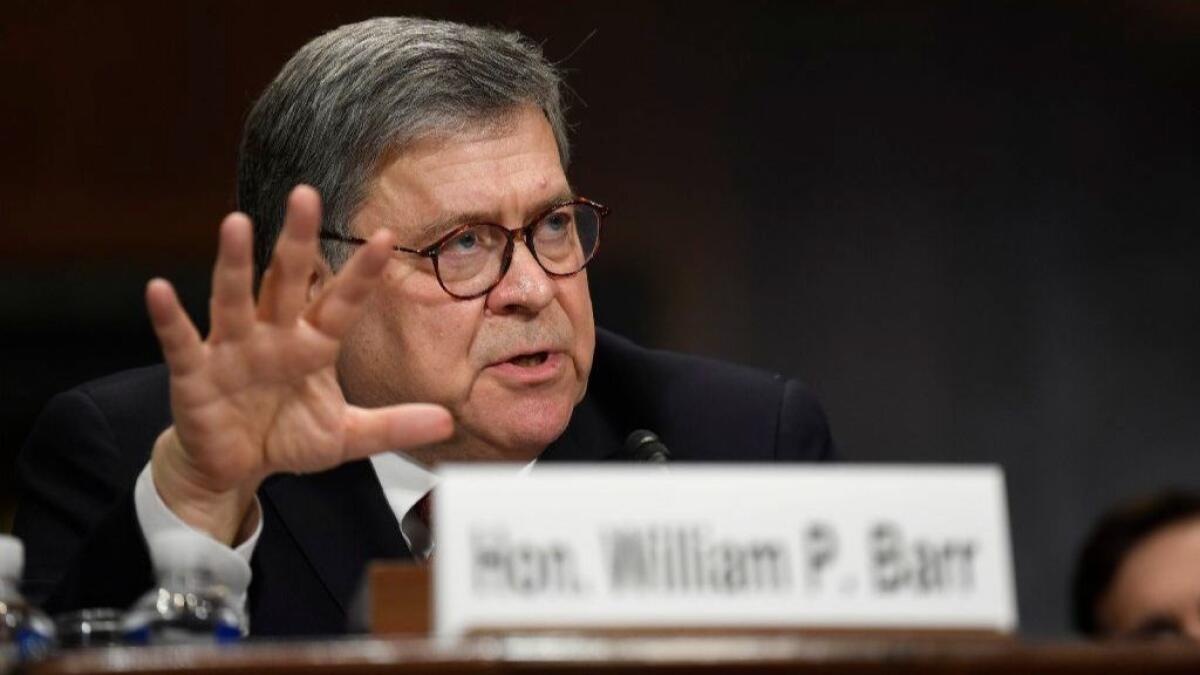Opinion: Democrats worry that William Barr might be helping Trump take ‘revenge.’ Are they right?

- Share via
Prominent Democrats in Congress are raising an alarm about reports that the Justice Department has opened a criminal investigation into the origins of the investigation of possible collusion between Russia and the 2016 Trump campaign. Of course, President Trump long ago concluded that the Russia investigation, eventually supervised by special counsel Robert S. Mueller III, was a hoax and a witch hunt.
Reps. Adam B. Schiff (D-Burbank) and Jerrold Nadler (D-N.Y.), the chairs of the House Intelligence and Judiciary committees respectively, said in a statement that the reports of a criminal investigation, if true, “raise profound new concerns that the Department of Justice under Atty. Gen. William Barr has lost its independence and become a vehicle for President Trump’s political revenge.”
Mark Warner of Virginia, the top Democrat on the Senate Intelligence Committee and a lawmaker who typically strikes a less partisan profile than Nadler or Schiff, also expressed concern. Warner noted on Twitter that his panel “is wrapping up a three-year bipartisan investigation” of Russian interference in the 2016 election, “and we’ve found nothing remotely justifying this.” He added that Barr “needs to come before Congress and explain himself.”
The Democrats’ concern is understandable. Barr has repeatedly disappointed those who thought his prior service as attorney general and his reputation for professionalism would be an insurance policy against an overly political approach to the position.
First there was the letter Barr sent to the House and Senate Judiciary committees in March purporting to summarize the conclusions of Mueller’s investigation. The special counsel complained to the attorney general that Barr’s letter “did not fully capture the context, nature, and substance” of his investigation.
In that same letter to Congress, Barr disclosed that he and then-Deputy Atty. Gen. Rod Rosenstein had concluded that the evidence Mueller had gathered was insufficient to establish that Trump had committed an “obstruction-of-justice offense.” Mueller had left that question open, saying that “while this report does not conclude that the president committed as crime, it also does not exonerate him.”
Then, in testimony in April before a Senate Appropriations subcommittee, Barr said that “spying did occur” during FBI scrutiny of people associated with the Trump campaign. This echoed Trump’s claim that he was the victim of politically motivated surveillance. (Trump’s Twitter tag for this conspiracy theory was “SPYGATE.”)
This history, troubling as it is, doesn’t establish that Barr is doing the president’s bidding in opening a criminal investigation in connection with the origins of the Russia investigation. It’s also notable that the inquiry is being led by U.S. Atty. John Durham, a veteran prosecutor who is widely respected and can’t be dismissed as a Trump toady.
Finally, as some commentators speculate, it’s possible that the alleged criminal activity here concerns leaks, not illegality in the Russia investigation itself. Greg Sargent in the Washington Post further suggests that the leak about a criminal investigation might be an attempt to calm Trump at a time when the House impeachment inquiry is closing in “all around him.”
Even so, the suspicious reaction to this report from Democrats is a reminder that the one thing that unites the nation’s two parties is a fear that the Justice Department is in the business of politics, not law.
More to Read
A cure for the common opinion
Get thought-provoking perspectives with our weekly newsletter.
You may occasionally receive promotional content from the Los Angeles Times.











